Loving the latest batch of images of Bong Joon-ho’s SNOWPIERCER that have appeared online. Still no word when the film might get a release day, sadly. But it feels good to see Bong’s film shaping up so nicely.




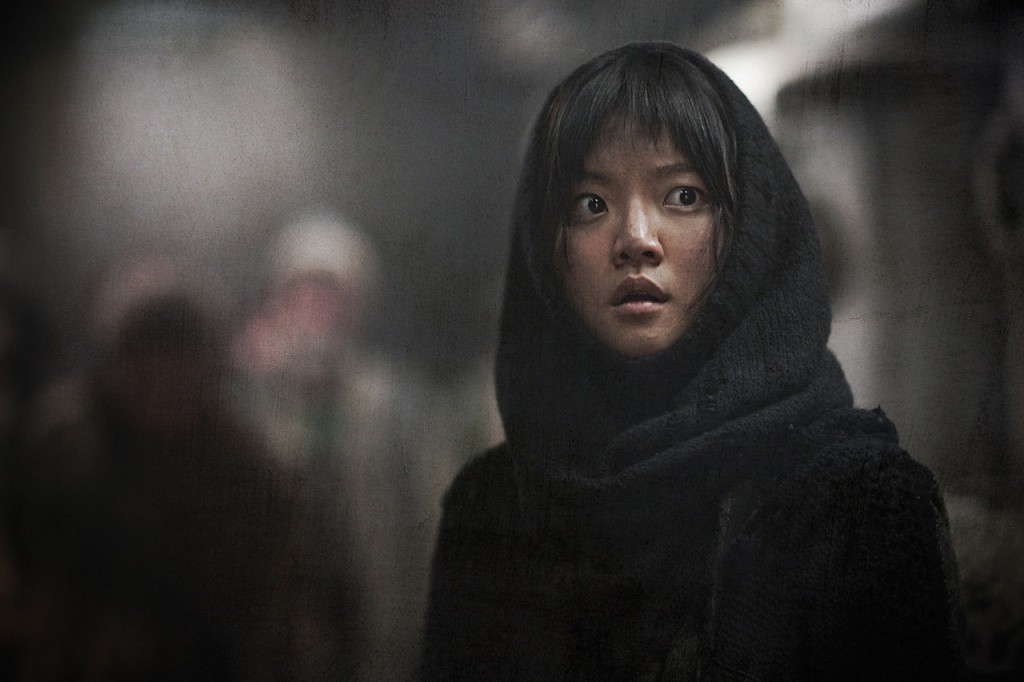
And here’s the man, Song Kang-ho:

Books, blog and other blather
Loving the latest batch of images of Bong Joon-ho’s SNOWPIERCER that have appeared online. Still no word when the film might get a release day, sadly. But it feels good to see Bong’s film shaping up so nicely.





And here’s the man, Song Kang-ho:

So, I was enjoying Andrei Lankov’s latest New York Times column on North Korea — as usual, he is the most astute observer on that regime — when I did a bit of wayward Googling and discovered that Mr. Lankov has a new book out about Pyongyang, the charming Kim family, and all that good stuff.
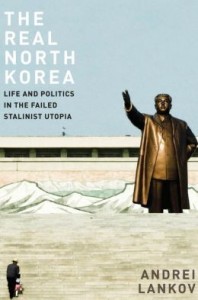
It took about 30 seconds before I had The Real North Korea on my Kindle. I’m really looking forward to reading it … although I am slammed with enough work and deadlines these days that I fear I will not get it done for a couple of months.
As for Andrei’s latest column I mentioned, here’s the key graph:
If history is any guide, in a few weeks’ time things will calm down. North Korea’s media will tell its people that the might of the People’s Army and the strategic genius of their new young leader made the terrified American imperialists cancel their plans to invade the North. Meanwhile, North Korea’s diplomats will approach their international counterparts and start probing for aid and political concessions.
In other words, it is business as usual on the Korean Peninsula.
Just for kicks, here’s a video of Mia Kim — one of the members of the Kim Sisters, a popular Korean group from the 1950s and 60s — singing in Hungary in 2009.
So, apparently the latest round of Euro-crisis wackamole has moved on to Portugal, with worse-then-expected economic news leading to worse-than-expected cuts. Slash, rinse, repeat. As usual, economists like Paul Krugman are saying how foolish the whole austerity cycle is, and as usual no one in authority listens to them (although the Portuguese courts struck down some of the government’s cuts last Friday).
Now, at this point I do not find it very surprising that the political leader in Portugal, as pretty much everywhere in Europe do not have the imagination or the stones to take a stand against the voodoo-economics of cut-cut-cut. But what does surprise me greatly is how little popular support there is for fixing the Europea’s true problem — no, not excessive spending or the welfare state, I’m talking about ending the euro itself.

Living on the Iberian peninsula and traveling around Europe, you see plenty of signs that people are opposed to their governments’ austerity plans. There are oodles of rallies and posters decrying cuts, calling for “socialisme” and “reform”, demanding strikes, etc. But all of that misses the point, doesn’t it? Because when economists say austerity is stupid, they are not advocating continuing spending as if nothing was wrong. The real argument is that the euro itself is fundamentally flawed, and unless Europe turns its currency union into a fuller fiscal union, the euro simply cannot work.
It is a clear and powerful argument. However, I have seen almost no popular pressure to ditch the euro. It isn’t a chant at rallies or a common poster. No political parties of note are rallying behind the idea. And without a commitment to fix the real problem that is plaguing Europe, I don’t see how this problem is going to get fixed … at least not any time soon.
One of my bigger arguments in Pop Goes Korea was that the Korean Wave was not really about Korea at all; it was actually about globalization. The amazing success Korea has had in media and entertainment over the past 10-15 years was not because Korea was unique and different as much as it was because Korea has ahead of the curve.
Korea was at the forefront of the Internet revolution, and many of the changes that online has wrought came to Korea first (or at least quicker and more dramatically). Music, for example — online/digital sales in Korea have surpassed physical sales (CDs, etc.) since at least 2004.
But, the thing is, those changes are increasingly affecting the rest of the world now. With music now, $5.6 billion is spent globally on digital music (that’s about 34% of all music revenue), with digital exceeding physical sales in Sweden, Norway, India, and the United States, and much of the rest of the world is catching up.
Which brings me to Turkey and Turkish television. I wrote about Turkish soaps in 2010, but they have just continued to grow in popularity since then, earning $90 million in exports last year, up from just $1 million in 2007. They have found big fans throughout Central Asia, the Balkans, the Arab World and even Latin America. And what’s driving that success? Good production values and stories, as well as the need for more content — cable/satellite TV means more channels, and those channels need something to fill the void. Turkish producers have done their best to fill it.

One of Turkey’s most popular TV shows, Magnificent Century (or “Muhteşem Yüzyıl”).
And it is not just Turkey. In Eastern Europe, the growth of pay-TV (now an $8.3 billion market) has also created more demand, leading producers to emulate Russian, Scandinavian, and other content.
With the success of Turkish soft power, predictably, has come a backlash, with many countries banning Turkish soaps. While cultural protectionism is a common issue all over the world (at least when a country is importing culture … exporters tend to be much more open-minded), I do think a lot of journalists oversell the issue. As one wrote:
Remember, the Turks did not feel they should be a satellite state of Brazil just because they so dearly loved Brazilian soap operas in the 1980s and 1990s. Nor did the Arabs begin to love the Americans/America because they had a habit of watching more Hollywood films (than Turkish soaps).
On the other hand (if I may undercut my own argument), when you look at the IFPI’s international music numbers, local sales are still overwhelmingly important in most markets. But I don’t think that is terribly surprising. Exports are more of an issue in capital-intensive forms of media, like TV or movies. When you go to the big international content markets (film, TV, music, or whatever), you are increasingly seeing an international presence selling content, not just buying. It’s still the early phases of the new media world we are growing into, but I’m still encouraged by what I am seeing.
Over at Ta-Nehsi Coates’ blog, he has been writing about his travels to Europe, where he is studying French. In some ways, his posts are very typical of the first-time international traveler — confusion, loneliness, reactions to weird differences, self-reflection on one’s weird reactions to differences. But in other ways — Coates being an adult from West Baltimore — his posts are very different and fascinating.
At one point, Coates says:
I am an American and an Anglophone. With that tile I could, at any moment, make myself understood here. It takes a particular kind of tyranny to demand access to everyone’s power, to everyone’s family reunion.
Which I found a rather interesting take on the unilingual, Anglo-American mindset. Although the more I’ve traveled, the more I have seen it exhibited by other cultures, too — by the Chinese, Spanish, Russians, Koreans, Germans, and even the French.
I first traveled to the United States when I was 18, and that was odd enough. But that was still the same language, food, and TV shows, for the most part. My first trip to France occurred when I was around 23 (and still very much an immature dork), and I probably had many of the same reactions Coates had to Paris. You get amazed by all the cool stuff, you walk around to the parks and museums, you wish your French was better, you get hit by bouts of profound loneliness, you are constantly overwhelmed by the experience.

By the time I was 25, I finally made it to Korea, where I got to experience the new-traveler sensations all over again. But it was also different. Korea was a lot different than France or anywhere in western Europe. But it was not my first time traveling anymore, so I had grown a little more comfortable at being uncomfortable (a very important part of becoming a grown-up, imho).
My first week in Korea felt like a year, at least. It was like this vast information dump was hitting my brain, so all the neurons were firing, slowing down time in the process. The first month felt nearly as long again, as I slowly began to figure out this totally different country. And the whole first year, it was much the same process. About six months in, I met someone who had been living in Korea for four years, and he might as well have said he had been living under a polar ice cap — I just could not imagine it. (Granted, this was a smaller city in Korea, not Seoul, and this guy lived outside that town in the countryside … and it was the mid-1990s).
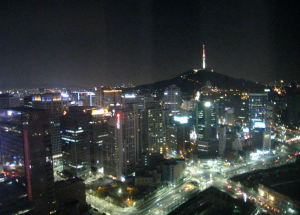
By the second year in Korea, I had settled in and was normalizing my life there, and my two-year anniversary came and went without my even realizing it for a couple of weeks. Next thing you know, you’ve been there a decade.
Even as I was living in Korea, I made a point of traveling as much as I could, going to China, Mongolia, Japan, and many of the other typical places one travels. With each trip, I could feel the sense of overwhelming ease off. I mean, it is still a bit disorienting going to a new place for the first time, but you get used to it. You get more comfortable at being uncomfortable.
Now, many years later, I find myself back in Europe. Things go wrong, communication breaks down, and I try not to let it bother me. I try to enjoy the good stuff and take the hiccups in stride. Of course, I am not traveling by myself anymore, which makes a big difference, too. In my 20s and early 30s, I always traveled alone, which can be more alienating and strange, but it also exposes the neurons to the full force of a new locale and new people. Traveling with a spouse is better, but you always feel a bit more distant from the places you visit … like you are taking a small, two-person country with you at all times. Instead of the tyranny of demanding access to everyone else’s family reunions, you are a family of your own, and now you man the gates and keep out interlopers.
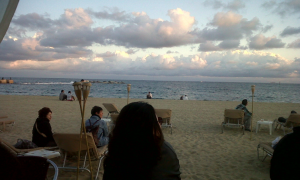
We’ll be heading back to Asia soon — to Southeast Asia instead of Korea — and I’m looking forward to the whole experience all over again. I’m sure there will be some more hiccups, but nothing too bad. I doubt we’ll be feeling overwhelmed by the culture shock or food or anything like that again. I’m pretty comfortable at being uncomfortable. But sometimes I wish I wasn’t.

A few days ago, Annie Ko of the band Love X Stereo, wrote a column in the Guardian about her favorite Seoul-related songs. It’s a pretty good list, too, and includes Cho Yong-pil’s “Seoul Seoul Seoul,” He6’s “Come On Baby,” and Lee Sangeun’s “Secret Garden” (not to mention smartly adding her own “Soul City”).
So that got me thinking about other Seoul-related songs. Of course, Byul.org put together a CD last year featuring indie bands singing about Seoul, called Seoul Seoul Seoul (I assume in reference to the Cho Yong-pil song).
But, to be honest, most of those songs did not excite me terribly much. I guess it is hard to write songs about a city (even if Jay-Z makes it look easy). What other Seoul-related songs are there?
There’s Yang Hee-eun’s “Road to Seoul”:
And Yang Byung-jib’s “Seoul Sky 1” (a cover of Woody Guthrie’s “New York Town” that starts this video) and “Seoul Sky 2” (a cover of Phil Ochs’ “Lou Marsh”, at 21:17):
Add4’s “Seoul Square” (starting at 05:00):
And I supposed you could include Neon Bunny’s entire album Seoulight, if only because of its name (and because it is so catchy). Here’s “Falling” from that album:
I’m sure there’s plenty more that I’m missing, but those are some pretty good ones.
UPDATE: Okay, I suck — I totally forgot about Hyeuni’s “Third Han River Bridge.” One of the most iconic Seoul songs of all time. HA!
Not sure why this took me so long, but at last I have imported all of Korea Pop Wars, my first blog, into this current site. I guess that does not help much with old incoming links to KPW, but at least it makes all that information more easily available for people who read my little website.
It is kind of fun looking at those old posts. After all, I started the last blog in 2006, during perhaps Korea’s best movie year ever. So you had posts like this box office update, when there were zero Hollywood films in the top 10 — seriously, there were eight Korean films, one Japanese movie, and a Spanish film. And here is a post about the Korean country singer (and friend) Jimmy Lee Jones. Last I checked, Jimmy is still going strong, with his bar down in Daejeon.
Anyhow, if you were looking for my old posts about movies or music or whatever, hopefully they will be easier to find now.
I was just checking out the lineup of musicians and acts playing at this year’s SXSW in Texas and was really amazed by the Korea presence this year — 10 Korean artists, not including Korean-American musicians. In 2010, I think there was just one.
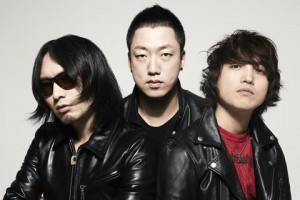
Here’s the full listing:
There is also Far East Movement, with the Korean-American quotient. And, of course, there are plenty of other Asian acts, from Japan and around the continent.
The important thing, imho, is how Korean groups are increasingly getting out of Korea and playing around the world. That sort of exposure — exposing the bands to new audience and exposing new audiences and acts to the bands — is so important to developing the Korea scene. That sort of thing is a big part of what made Korean movies so good, 15 or 20 years ago. It’s great to see music doing the same.
Anyhow, Galaxy Express played at SXSW last year, too, when they scores a pretty cool mention in the New York Times. And once again, they will be going on a tour after the festival, hitting 25 shows in a dozen states (or so says their Facebook page). I’ll post the full schedule once I hear about it.
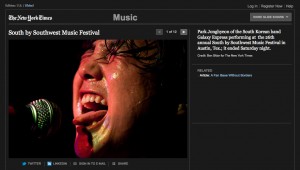
I just came across this Daehan News feature about South Korean President Chun Doo-hwan visiting Canada in 1982 and thought some people might get a kick out of it.
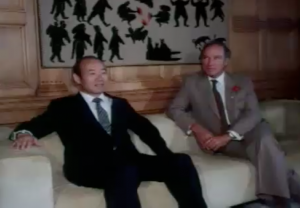
Chun, of course, came to power in 1980 (officially), following the assassination of Park Chung Hee in 1979 and the short-lived presidency of Choi Kyu-ha. It was a pretty dicey time for North-South relations, so Chun probably needed all the legitimacy he could find.
There’s a short New York Times article on his visit here.
Just to give an overview of this video:
0:00 – Leaves African leg of his trip
0:05 – Ottawa and Parliament buildings (“Canada is a peaceful country,” says the narrator)
0:31 – Chun Doo-hwan and his wife Rhee Soon-ja disembark their plane. Greeted by Edward Shreyer
1:13 – Rideau Hall for official reception
1:31 – Prime Minister’s residence for some garden party
2:01 – Choppers to Montreal to meet with Korean War veterans
2:45 – Back to Ottawa for an awkward-looking meeting with Pierre Trudeau
Not mentioned in the video (unsurprisingly) is the assassination plot to kill Chun during his visit. Choi Jung-hwa, a son of the International Taekwondo Federation founder and North Korea-friendly Choi Hong-hi, had been living in Mississauga at the time. The younger Choi allegedly tried hiring a couple of people to kill Chun while the South Korean president was in Canada. But apparently that plot was broken up months before the visit — Choi went into hiding in Europe for years before returning to Canada and spending a year in jail.
There’s more about Choi and his return to Korea in the JoongAng Daily, including the great news that North Korea disguised its agents as taekwondo masters working for ITF and dispatched them abroad. Given that I studied taekwondo at an ITF gym while in high school, it makes me wonder if I could be a sleeper agent.
© 2024 Mark James Russell
Theme by Anders Noren — Up ↑